Iran hanged 133 people in a single month
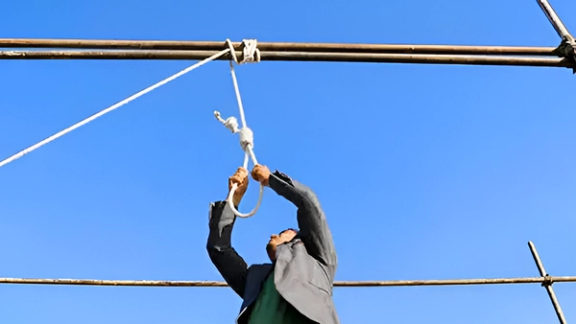
Iran executed at least 133 people in the Iranian month of Aban (ended November 20), according to a report by HRANA. The statistic translates to an average of more than four executions per day.

Iran executed at least 133 people in the Iranian month of Aban (ended November 20), according to a report by HRANA. The statistic translates to an average of more than four executions per day.
The UN General Assembly on Wednesday passed a resolution criticizing the Islamic Republic for its human rights record.
The Wednesday resolution passed by the UN General Assembly also condemned "in the strongest terms the alarming increase in the application of the death penalty by the Islamic Republic of Iran in violation of its international obligations, including executions undertaken against persons on the basis of forced confessions and without fair trial and due process."
The resolution expressed "serious concern at the disproportionate application of the death penalty to persons belonging to minorities, particularly ethnic and religious minorities, who are targeted for death sentences relating to their alleged involvement in political or religious groups, and at the continued execution of women, which has reached the highest number of reported executions of women since 2013."
The resolution comes against the backdrop of the Islamic Republic's uptick in executions over the past few years. At least 711 people have been executed in Iran since January, according to the latest report by the Norway-based Iranian rights group Hengaw.
A Saturday report by Hengaw said that 13 of the 711 documented executions this year involved political prisoners. The group also documented 21 fatalities in Iran’s prisons in 2024, including four deaths of political detainees and eight deaths attributed to torture.
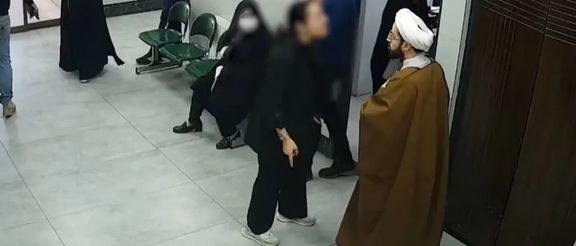
The UN General Assembly on Wednesday passed a resolution criticizing the Islamic Republic for its human rights record especially over women's rights, expressing special concern over mandatory hijab policies.
The resolution, drafted by Canada on November 6, was passed with 77 votes in favor, 66 abstentions and 28 votes against in a Wednesday session.
Russia, China, Belarus, Armenia, Cuba, Iraq, Indonesia, Oman, Pakistan, Algeria and Syria were among the countries that voted against the resolution.
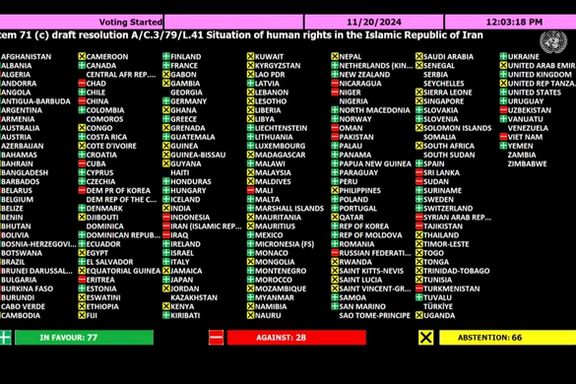
The resolution condemned "the intensified, targeted repression of women and girls by the Islamic Republic of Iran, both online and offline, and the lack of accountability and justice measures for human rights violations perpetrated against women and girls."
It also expressed "serious concern at the discriminatory compulsory veiling laws and policies of the Islamic Republic of Iran, which fundamentally undermine the human rights of women and girls, expressed concern at the escalation in the enforcement of these laws and policies... and reaffirmed calls for all such laws and policies to be repealed."
Iran's Foreign Ministry spokesman on Wednesday condemned the resolution, calling it a politically motivated and unjustifiable move.
Iranian women are facing tougher crackdowns for refusing to wear the compulsory hijab amid Iran’s conflict with Israel.
Morality police are also back on the streets in larger numbers, having been scaled back since the death of a young woman named Mahsa Amini in their custody in 2022.
Witnesses report a stronger presence around Tehran’s central districts, describing police foot patrols, detention vans and police motorcycle patrols.
A widely publicized incident earlier this month at the Islamic Azad University in Tehran brought the issue of hijab defiance back into the global spotlight. In protest against enforcement measures on campus, a female student named Ahoo Daryaei, removed her clothing in defiance of security staff intervening over her hijab.
Daryaei was transferred to a psychological center shortly after her arrest, drawing accusations from activists that the government is attempting to undermine her protest by portraying her actions as a sign of mental illness.
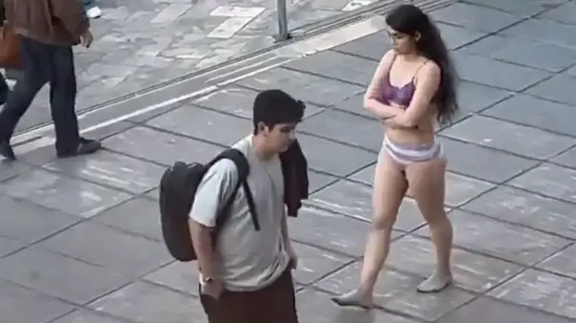
Strong condemnation of execution spree
The Wednesday resolution passed by the UN General Assembly also condemned "in the strongest terms the alarming increase in the application of the death penalty by the Islamic Republic of Iran in violation of its international obligations, including executions undertaken against persons on the basis of forced confessions and without fair trial and due process."
The resolution expressed "serious concern at the disproportionate application of the death penalty to persons belonging to minorities, particularly ethnic and religious minorities, who are targeted for death sentences relating to their alleged involvement in political or religious groups, and at the continued execution of women, which has reached the highest number of reported executions of women since 2013."
The resolution comes against the backdrop of the Islamic Republic's uptick in executions over the past few years. At least 711 people have been executed in Iran since January, according to the latest report by the Norway-based Iranian rights group Hengaw.
A Saturday report by Hengaw said that 13 of the 711 documented executions this year involved political prisoners. The group also documented 21 fatalities in Iran’s prisons in 2024, including four deaths of political detainees and eight deaths attributed to torture.

An Iranian activist who was detained after she confronted a motorcyclist who grabbed her from behind appeared from prison in a court hearing via video link, according to civil society group the Iranian Women Association.
The activist, Roshanak Molaei, was detained almost three weeks ago after she thwarted a harasser in a military uniform on a moped while she walked down a north Tehran street, putting the man in a headlock and summoning a crowd of bystanders.
Authorities have not clarified the grounds for her detention or any charges she faces.
CCTV footage of the incident went viral on social media, adding to the already raging debate in Iran over gender rights and perceived official misogyny under the ruling Islamic theocracy.
Molaei had posted the video on her X account, captioning it: "Being a woman in Iran."
Tehran police confirmed the encounter and said the motorcyclist was referred to judicial authorities for “harassment of women” without saying if the man had been arrested or charged.
The apparent disparity between the treatment of Molaei and his harasser as well as Molaei’s continued detention has drawn criticism from women’s rights advocates, who question why the victim of harassment is being prosecuted.
Molaei was arrested in November 2022 during widespread women's rights protests known as the Woman Life Freedom movement. She was sentenced to five years in prison for acting against national security, insulting Iran's supreme leader Ali Khamenei and appearing in public without the mandatory hijab.

An Iranian political activist has accused security forces of sexual and verbal abuse when he was arrested in Tehran on Monday.
Writing on X, Hossein Ronaghi detailed his allegations. "Inside the vehicle, they restrained both of my hands. The driver kept repeating vulgar insults about my mother. The one seated on my left grabbed my left hand and forcibly placed it on his groin, demanding that I touch him," he said.
He accused multiple officers of having inflicted verbal and physical abuse. "The officer on my left slid his hand under my shirt and commented to the one on his right, 'he's so pale, I want him to be my bride tonight in detention.' The other added, 'I'll take his mother in front of his eyes,'" he wrote on X.
Ronaghi, a 37-year-old blogger and dissident, had staged a sit-in protest to demand justice for fellow activist Kianoosh Sanjari, who committed suicide last week in protest against government oppression.
The journalist and activist had warned in a social media post that he would end his life unless several political prisoners, including Fatemeh Sepehri and Toomaj Salehi, were released.
Ronaghi used X to highlight problems faced by dissidents under the Islamic Republic's legal system, issues highlighted by international rights groups such as Amnesty International which has accused Iran of forced confessions among other practices such as torture.
"These are the same people who use such methods to extract confessions from people in Ekbatan," he wrote, referring to a neighborhood in western Tehran where security forces have been accused of coercing protesters into false admissions.
Last week, Iran's judiciary issued death sentences for six individuals living in Ekbatan accused of involvement in the killing of a Basij militia member during the nationwide protests that erupted in 2022.
Human rights organizations have repeatedly documented the systematic use of sexual violence in Iran’s prisons. Amnesty International reported in March 2023 that detained protesters, including children, were subjected to rape, groping, and electric shocks to the genitals. The organization highlighted these methods as tools to punish and extract confessions from detainees.
Ronaghi has been arrested multiple times since 2009 and has long written of torture in custody. Released on bail in November 2023 after a prolonged hunger strike, he has faced ongoing harassment from authorities.
He lost a kidney during a previous incarceration and continues to suffer from severe health complications. He has currently sewn his lips together in protest in a bid to raise awareness to the case of Sanjari.
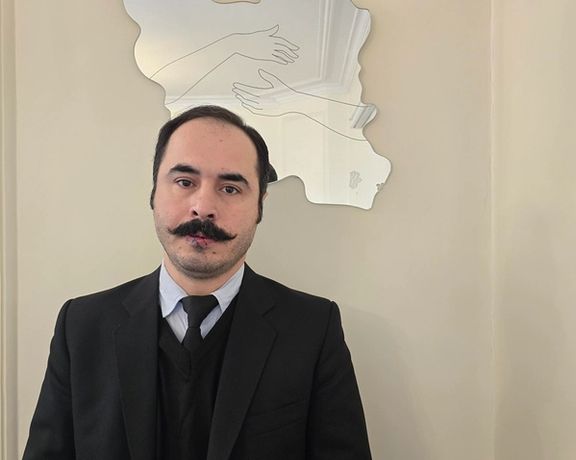
One of Iran's most vocal dissidents outside of prison is trying a new tack: sewing his lips shut and staging a silent protest at one of Tehran's busiest intersections.
Alone and defiant with one fist in the air in the middle of a busy intersection in Tehran, prominent Iranian dissident and blogger Hossein Ronaghi held a sit-in protest that briefly landed him in jail, according to his mother who spoke to Iran International.
Ronaghi had posted a photo of himself with his lips sewn shut on Saturday.
“Perhaps this will be a wake-up call … Long live Iran.”
Ronaghi was repeating the final words of his friend Kianoosh Sanjari, a journalist and activist who took his own life last week to protest the imprisonment of fellow dissidents.
Ronaghi has since been released from prison.
Videos posted to social media show Ronaghi protesting on Monday in the busy Valiasr junction as cars, motorbikes and pedestrians cross by without seemingly making any reaction.
Ronaghi’s mother Zoleikha Mousavi told Iran International that the street was filled with plainclothes officers, most of them women.
Some officers also allegedly attacked Mousavi, but after her shouting and protests, they let her go.
She told Iran International exclusively that an ambulance sped towards her son, but said she intervened to stop it. Several agents later took Ronaghi away in what she described as a violent arrest.
On Telegram, Ronaghi’s account posted that he was arrested in the early evening at the intersection by several armed officers and that after several hours of detention he was dropped off in front of his home by the same officers.
Ronaghi also announced that he would appear before a Revolutionary Court in Tehran with his sewn lips in another form of resistance.
The gesture would be protest, he said, “against the occupiers of this land, against poverty, against executions, against the oppression of women and imprisonment of the people, and against every form of injustice imposed on this country by the Islamic Republic," he wrote on X.
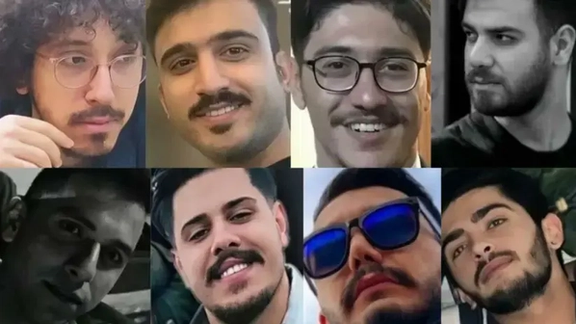
Four German parliamentarians have taken on political sponsorships for four Iranian protesters who were recently sentenced to death over their alleged involvement in the killing of a Basij militia member during the 2022 nationwide protests.
On November 13, the Islamic Republic's Judiciary issued death sentences for Milad Armoun, Alireza Kafaei, Amir Mohammad Khosheghbal, Navid Najaran, Hossein Nemati, and Alireza Barmarzpournak, the six individuals accused of killing Basij member Arman Aliverdi in Tehran's Ekbatan apartment complex. The charges against them remain contested, however, due to a lack of clear evidence linking them to the crime.
In a statement, German Parliament members Tobias B. Bacherle, Oliver Kaczmarek, and Anne Monika Spallek, along with Lisa-Kristin Kapteinat from the North Rhine-Westphalia State Parliament, announced political sponsorships for four of the accused, urging Iran's government to release them immediately.
"We express our profound concern over the devastating developments... They were all sentenced to death by the brutal Iranian regime without a fair trial and under inhumane conditions," the German MPs said, adding that the Islamic Republic "seeks to carry out executions to suppress resistance entirely."
The Ekbatan Complex case, tied to the broader unrest that followed the death of Mahsa Amini in morality police custody, involves accusations that the defendants participated in Aliverdi's killing. A video circulating on social media showed Aliverdi, bleeding from the face and head as a protester kicked him. Authorities allege that protesters stabbed him, but the defendants deny the charges, with Ekbatan residents saying that Aliverdi was attempting to infiltrate the protests.
The controversy surrounding the case is compounded by reports of torture and mistreatment of the accused, with human rights organizations expressing concern over the fairness of the trial.
Iran's execution spree
The death sentences for the six protesters came against the backdrop of the Islamic Republic's execution spree over the past few years. At least 711 people have been executed in Iran since January, prompting female political prisoners at Evin prison in Tehran to call on authorities to stop issuing death sentences.
The Norway-based Iranian rights group Hengaw reported on Saturday that 13 of the 711 documented executions this year involved political prisoners. The group also documented 21 fatalities in Iran’s prisons in 2024, including four deaths of political detainees and eight deaths attributed to torture.
"Iran has an appalling record of executions, most recently evidenced by the execution of German citizen Jamshid Sharmahd," the four German parliamentarians said in their statement released on Saturday. "The systematic use of the death penalty to suppress political opinions constitutes a grave violation of fundamental human rights and has been strongly condemned by the international community."
On November 5, Iran’s judiciary announced that German-Iranian citizen Jamshid Sharmahd died in late October before his scheduled execution. “Jamshid Sharmahd's death sentence was set to be carried out, but fate offered no reprieve, and he died before the execution could proceed," the Judiciary's spokesman said.
Sharmahd was abducted by Iranian agents during a visit to the United Arab Emirates in 2020 and forcibly taken to Iran. In February 2023, Iran's Judiciary sentenced him to death on charges of endangering national security. Tehran says that Sharmahd was responsible for a 2008 attack on a mosque in Shiraz that killed 14 people and injured 200.